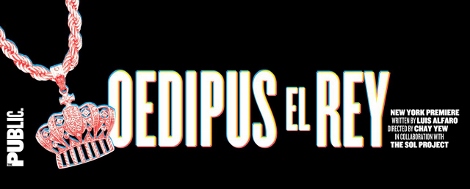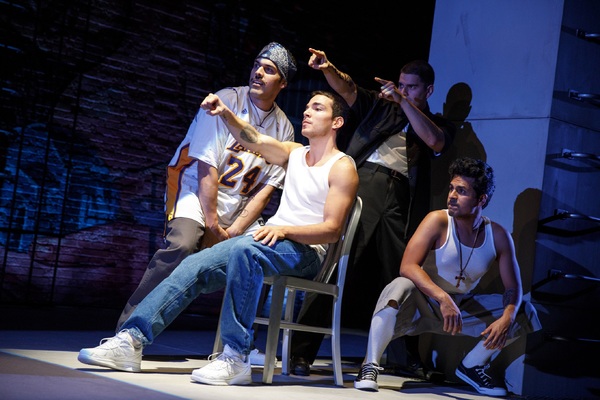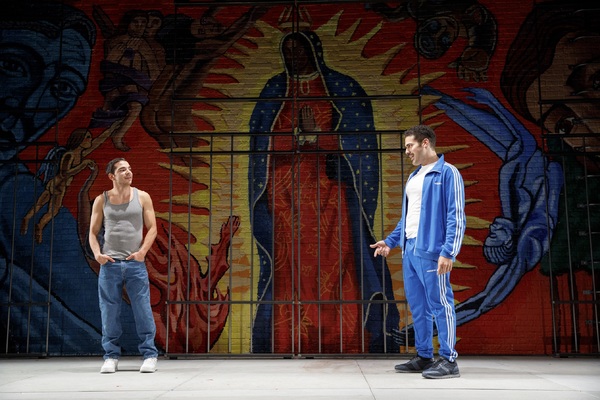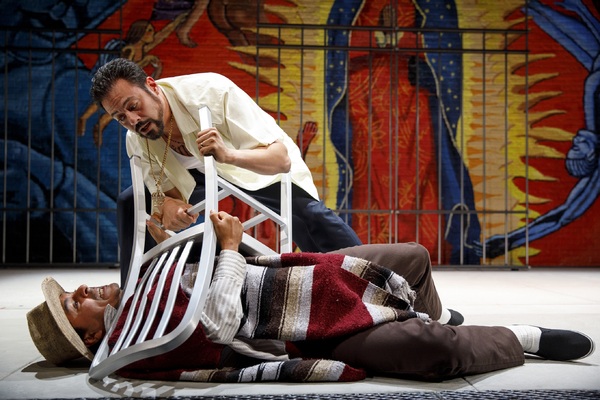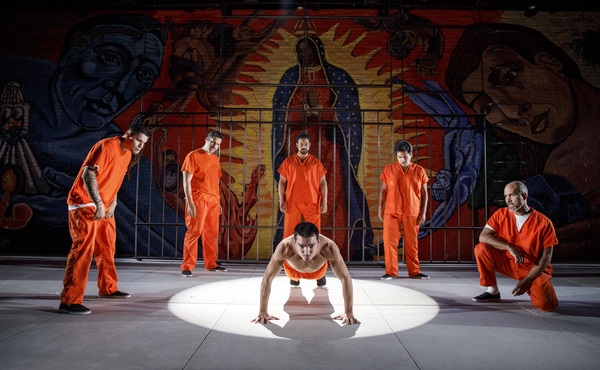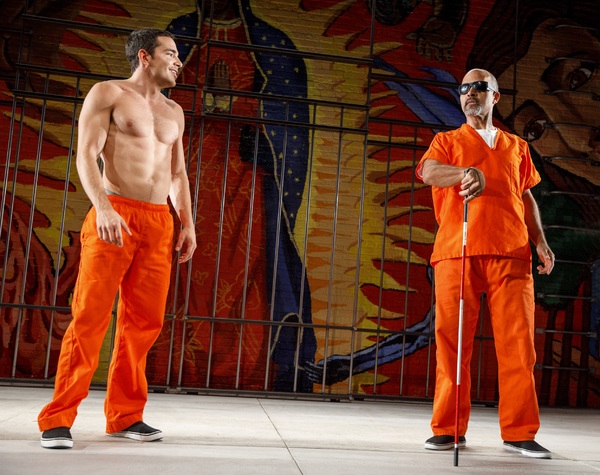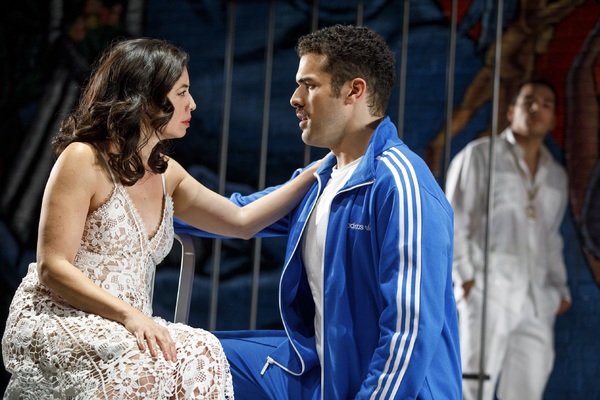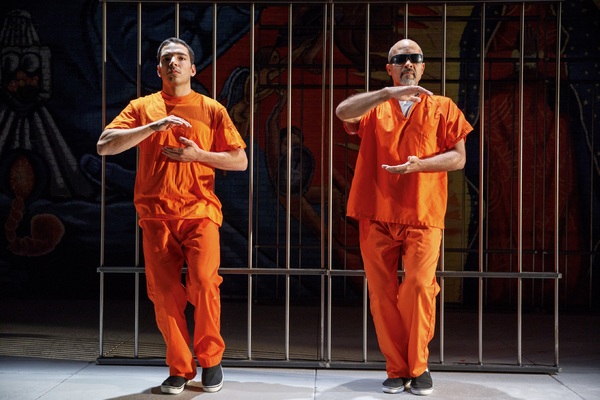A REY OF SUNSHINE ENDS UP CLOUDY
Director Chay Yew mounts a spectacular production of Luis Alfaro’s Oedipus El Rey, a reworking of Sophocles’ tragedy set in the Barrio of present-day Los Angeles. Energetic performances, excellent use of a spare but effective set, dramatic lighting and music all make a powerful impression. This in spite of the fact that the play itself’”though it begins well and is intelligent and often funny’”in the end doesn’t satisfy.
Jocasta (Sandra Delgado), wife of gang leader and king of the Barrio, Laius (Juan Francisco Villa), is about to give birth to a son when an oracle tells her husband that the boy will kill him. Laius drugs Jocasta and gives the newborn to his right hand man Tiresias (Julio Monge) to murder. But Tiresias takes pity on the child and raises him as his own. He does a questionable job however, as the boy, Oedipus (Juan Castano), spends much of his youth in jail, which is where we first meet him on the eve of his release.
Once out Oedipus tries to go straight but the obstacles of the outside world prove too taxing. Then, on his way to the Barrio, he gets into a traffic dispute with Laius and ends up killing him. Later, Oedipus meets Jocasta, and without realizing she is the widow of the man he’s slain, marries her.
Mr. Yew’s revved up actors energetically crisscross the stage, fight, work out, climb up columns, open and close the sliding metal gates which serve as everything from prison bars to park fences. There are some wonderfully inventive visual effects, like when three owls visit Oedipus. Three actors, invisible in the shadows, put on mittens on which are drawn reflective green “eyes” that glow, blinking every time the actors close and open their hands. The effect is delightful. And the sphinx as a glowing emerald dragon is magical. Lap Chi Chu’s bold lighting design makes excellent use of darkness and spotlights. And Mr. Castano, besides delivering a sympathetic performance, physically is really something to look at’”he moves with the stalking grace of a fighter and his chiseled body brings to mind a youthful Greek god. The show makes an impression on the eyes, which in itself lends it a kind of depth. Still, the material leaves one wanting.
A religious mural’”like something one might see in a barrio’”covers the rear wall of Riccardo Hernandez’s set. The work is intentionally primitive with mystical overtones. The same thing can be said of the world Mr. Alfaro is trying to create. There’s a lot of talk about God, destiny, fate, faith, belief in the supernatural, in healers and seers. There’s also talk of the American prison system and the realities of being an ex-con, as well as of being an illegal migrant worker toiling in the fields. Mr. Alfaro mixes mythologies with reality and it works well for the first half of the play. But then, beginning in the middle of the post-coital scene between Jocasta and Oedipus, conversations start getting repetitive and the script loses its bounce. It’s as if Mr. Alfaro can’t decide where to go from here, or what the tale of Oedipus has to do with the Barrio or East Los Angeles, or with any of the other elements he’s loaded into his script.
A number of story points’”Oedipus trying to find work, Oedipus extorting money from the neighborhood’”are glossed over, rendered not as scenes but as sketches that show the idea of the thing instead of the thing itself. We don’t much mind when it’s happening’”we assume these are mere appetizers before a substantial main course. But the main course never comes. In general, and despite the actors’ admirable efforts, the writing never quite offers a sense of authenticity’”not with respect to prison or the ex-con’s struggle or gang life or Barrio culture; not with respect to patricide or incest or the spiritual or mythological or the mystical elements of the story. There’s a lot of talk of these things but little of it lands emotionally, and much of it we’ve heard before.
There’s a line that Jocasta says of the Barrio people after the first time she and Oedipus have sex, which goes something like: We don’t have a history so we have to make up our own. The phrase stands out; it feels like maybe this is the stake around which this drama should be built. One can feel the vibration of ideas within Mr. Alfaro’s work. But like so many problematic plays this one feels like it can use a few rewrites.
Additional cast: Reza Salazar, Brian Quijada, Joel Perez.
photos by Joan Marcus
Oedipus El Rey
The Public Theater
in collaboration with the Sol Project
LuEster Hall, 425 Lafayette Street (at Astor Place)
ends on December 3, 2017
for tickets, call 212. 967.7555 or visit Public Theater
